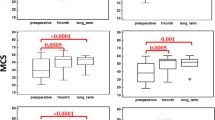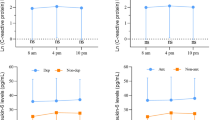Abstract
Purpose
Hypercortisolism is associated with a high prevalence of depression and impaired health-related quality of life (QoL). According to the available literature, studies examining the depression risk in patients with adrenal incidentalomas (AI), nonfunctioning and the ones with (possible) autonomous cortisol secretion ((P)ACS) are scarce. The aim of this observational, case–control study was to screen patients with nonfunctioning adrenal incidentalomas (NAI) and the ones with (P)ACS for depression and to assess their QoL.
Methods
The total studied group consisted of 92 subjects—26 with NAI, 34 with (P)ACS and 32 age-matched healthy controls (HC). To screen for depression, we used the Beck Depression Inventory-II (BDI-II) and to assess the QoL, we used the Short-Form 36 Health Survey (SF-36).
Results
Patients with (P)ACS had significantly higher BDI-II scores and substantially lower QoL than patients with NAI or HC. Midnight cortisol level was the most significant predictor of BDI-II and SF-36 score. The receiver operating characteristic curve analysis demonstrated that a midnight cortisol value of 86.95 nmol/l had a high sensitivity (82.8%) and high specificity (80%) for detection of mild depression in patients with (P)ACS.
Conclusion
Screening for depression and QoL assessment should become an integral part of clinical evaluation in patients with (P)ACS.



Similar content being viewed by others
References
Fassnacht M, Arlt W, Bancos I et al (2016) Management of adrenal incidentalomas: European society of endocrinology clinical practice guideline in collaboration with the European network for the study of adrenal tumors. Eur J Endocrinol 175:G1–G34. https://doi.org/10.1530/EJE-16-0467
Grumbach MM, Biller BMK, Braunstein GD et al (2003) Management of the clinically inapparent adrenal mass (“incidentaloma”). Ann Intern Med 138:424–429. https://doi.org/10.7326/0003-4819-138-5-200303040-00013
Terzolo M, Stigliano A, Chiodini I et al (2011) AME position statement on adrenal incidentaloma. Eur J Endocrinol 164:851–870. https://doi.org/10.1530/EJE-10-1147
Nieman LK, Biller BMK, Findling JW et al (2008) The diagnosis of cushing’s syndrome: an endocrine society clinical practice guideline. J Clin Endocrinol Metab 93:1526–1540. https://doi.org/10.1210/jc.2008-0125
Elhassan YS, Alahdab F, Prete A et al (2019) Natural history of adrenal incidentalomas with and without mild autonomous cortisol excess a systematic review and meta-analysis. Ann Intern Med 171:107–116. https://doi.org/10.7326/M18-3630
Ivović M, Marina LV, Vujović S et al (2013) Nondiabetic patients with either subclinical Cushing’s or nonfunctional adrenal incidentalomas have lower insulin sensitivity than healthy controls: clinical implications. Metabolism 62:786–792. https://doi.org/10.1016/j.metabol.2012.12.006
Pivonello R, Simeoli C, De Martino MC et al (2015) Neuropsychiatric disorders in Cushing’s syndrome. Front Neurosci 9:129. https://doi.org/10.3389/fnins.2015.00129
Vermalle M, Alessandrini M, Graillon T et al (2018) Lack of functional remission in Cushing’s syndrome. Endocrine 61:518–525. https://doi.org/10.1007/s12020-018-1664-7
Ivović M, Marina LV, Šojat AS et al (2020) Approach to the patient with subclinical Cushing’s syndrome. Curr Pharm Des 26:5584–5590. https://doi.org/10.2174/1381612826666200813134328
Morelli V, Ghielmetti A, Caldiroli A et al (2020) Mental health in patients with adrenal incidentalomas: is there a relation with different degrees of cortisol secretion? J Clin Endocrinol Metab 106:e130–e139. https://doi.org/10.1210/clinem/dgaa695
Sonino N, Guidi J, Fava GA (2015) Psychological aspects of endocrine disease. J R Coll Physicians Edinb 45:55–59. https://doi.org/10.4997/JRCPE.2015.113
Webb SM, Badia X, Baarahona MJ et al (2008) Evaluation of health-related quality of life in patients with Cushing’s syndrome with a new questionnaire. Eur J Endocrinol 158:623–630. https://doi.org/10.1530/EJE-07-0762
Kastelan D, Dzubur F, Dusek T et al (2011) Health-related quality of life and fatigue in patients with adrenal incidentaloma. Endocrine 40:84–89. https://doi.org/10.1007/s12020-011-9456-3
Mancia G, De Backer G, Dominiczak A et al (2007) 2007 ESH-ESC Practice guidelines for the management of arterial hypertension. J Hypertens 25:1751–1762. https://doi.org/10.1097/HJH.0b013e3282f0580f
American Diabetes Association (2010) Diagnosis and classification of diabetes mellitus. Diabetes Care. https://doi.org/10.2337/dc10-S062
Beck A, Steer RA, Brown GK (1996) Beck depression inventory—second edition: manual. In: San Antonio Psychol. Corp
Wang Y-P, Gorenstein C (2013) Psychometric properties of the Beck Depression Inventory-II: a comprehensive review. Braz J Psychiatry 35:416–431. https://doi.org/10.1590/1516-4446-2012-1048
Ware JE, Gandek B (1998) Overview of the SF-36 health survey and the international quality of life assessment (IQOLA) project. J Clin Epidemiol 51:903–912. https://doi.org/10.1016/S0895-4356(98)00081-X
Tucker G, Adams R, Wilson D (2013) Observed agreement problems between sub-scales and summary components of the SF-36 version 2—an alternative scoring method can correct the problem. PLoS ONE. https://doi.org/10.1371/journal.pone.0061191
Forget H, Lacroix A, Somma M, Cohen H (2000) Cognitive decline in patients with Cushing’s syndrome. J Int Neuropsychol Soc 6:20–29. https://doi.org/10.1017/S1355617700611037
Sonino N, Fallo F, Fava GA (2010) Psychosomatic aspects of Cushing’s syndrome. Rev Endocr Metab Disord 11:95–104. https://doi.org/10.1007/s11154-009-9123-7
Patil CG, Lad SP, Katznelson L, Laws ER (2007) Brain atrophy and cognitive deficits in Cushing’s disease. Neurosurg Focus 23:E11. https://doi.org/10.3171/foc.2007.23.3.13
Jacobs BL, Van Praag H, Gage FH (2000) Adult brain neurogenesis and psychiatry: a novel theory of depression. Mol Psychiatry 5:262–269. https://doi.org/10.1038/sj.mp.4000712
Newell-Price J, Trainer P, Perry L et al (1995) A single slee** midnight cortisol has 100% sensitivity for the diagnosis of Cushing’s syndrome. Clin Endocrinol (Oxf) 43:545–550. https://doi.org/10.1111/j.1365-2265.1995.tb02918.x
Terzolo M, Bovio S, Pia A et al (2005) Midnight serum cortisol as a marker of increased cardiovascular risk in patients with a clinically inapparent adrenal adenoma. Eur J Endocrinol 153:307–315. https://doi.org/10.1530/eje.1.01959
Eller-Vainicher C, Morelli V, Salcuni AS et al (2010) Accuracy of several parameters of hypothalamic-pituitary-adrenal axis activity in predicting before surgery the metabolic effects of the removal of an adrenal incidentaloma. Eur J Endocrinol 163:925–935. https://doi.org/10.1530/EJE-10-0602
Santos A, Crespo I, Aulinas A et al (2015) Quality of life in Cushing’s syndrome. Pituitary 18:195–200. https://doi.org/10.1007/s11102-015-0640-y
Valassi E, Crespo I, Keevil BG et al (2017) Affective alterations in patients with Cushing’s syndrome in remission are associated with decreased BDNF and cortisone levels. Eur J Endocrinol 176:221–231. https://doi.org/10.1530/EJE-16-0779
Valassi E, Santos A, Yaneva M et al (2011) The European Registry on Cushing’s syndrome: 2-Year experience. Baseline demographic and clinical characteristics. Eur J Endocrinol 165:383–392. https://doi.org/10.1530/EJE-11-0272
Katon WJ (2003) Clinical and health services relationships between major depression, depressive symptoms, and general medical illness. Biol Psychiatry 54:216–226. https://doi.org/10.1016/S0006-3223(03)00273-7
Chiodini I, Adda G, Scillitani A et al (2007) Cortisol secretion in patients with type 2 diabetes: relationship with chronic complications. Diabetes Care 30:83–88. https://doi.org/10.2337/dc06-1267
Axon RN, Zhao Y, Egede LE (2010) Association of depressive symptoms with all-cause and ischemic heart disease mortality in adults with self-reported hypertension. Am J Hypertens 23:30–37. https://doi.org/10.1038/ajh.2009.199
Trevisol DJ, Moreira LB, Fuchs FD, Fuchs SC (2012) Health-related quality of life is worse in individuals with hypertension under drug treatment: Results of population-based study. J Hum Hypertens 26:374–380. https://doi.org/10.1038/jhh.2011.48
Mezuk B, Eaton WW, Albrecht S, Golden SH (2008) Depression and type 2 diabetes over the lifespan: Aameta-analysis. Diabetes Care 31:2383–2390. https://doi.org/10.2337/dc08-0985
Rubin RR, Peyrot M (1999) Quality of life and diabetes. Diabetes Metab Res Rev 15:205–218. https://doi.org/10.1002/(SICI)1520-7560(199905/06)15:3%3c205::AID-DMRR29%3e3.0.CO;2-O
Marina LV, Ivović M, Tančić-Gajić M et al (2018) Luteinizing hormone and insulin resistance in menopausal patients with adrenal incidentalomas: The cause-effect relationship? Clin Endocrinol (Oxf) 88:541–548. https://doi.org/10.1111/cen.13541
Kamath J, Cruess DG, Claffey K et al (2012) Symptom distress associated with biopsy in women with suspect breast lesions. ISRN Oncol 2012:1–9. https://doi.org/10.5402/2012/898327
Holt RIG, De Groot M, Golden SH (2014) Diabetes and depression. Curr Diab Rep 14:491. https://doi.org/10.1007/s11892-014-0491-3
Funding
This work was supported by the Ministry of Science, Republic of Serbia (Grant number 175067).
Author information
Authors and Affiliations
Contributions
ASS: conceptualization, methodology, investigation, resources, writing—original draft, visualization; BDK: investigation, writing—review & editing; LVM: conceptualization, methodology, investigation, resources, writing—review & editing, supervision; MI: investigation, writing—review & editing; NVR: writing—review & editing; AK: writing—review & editing; AC: formal analysis, writing—review & editing; MTG: investigation; ZA: investigation; SM: investigation; SV: writing—review & editing.
Corresponding author
Ethics declarations
Conflict of interest
On behalf of all authors, the corresponding author states that there is no conflict of interest.
Ethics approval
The Faculty of Medicine, University of Belgrade, Ethics Committee approved the study.
Informed consent
Informed consent was obtained from all individual participants included in the study.
Additional information
Publisher's Note
Springer Nature remains neutral with regard to jurisdictional claims in published maps and institutional affiliations.
Rights and permissions
About this article
Cite this article
Šojat, A.S., Dunjić-Kostić, B., Marina, L.V. et al. Depression: another cortisol-related comorbidity in patients with adrenal incidentalomas and (possible) autonomous cortisol secretion. J Endocrinol Invest 44, 1935–1945 (2021). https://doi.org/10.1007/s40618-021-01509-4
Received:
Accepted:
Published:
Issue Date:
DOI: https://doi.org/10.1007/s40618-021-01509-4




